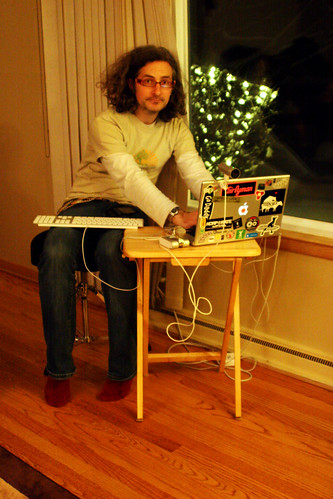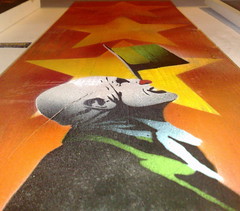 So, as I outlined in Pt 1, Social networks can be a really tough place to inhabit as a musician, because you’re going to get a LOT of artists sending you friend requests expecting you to check out their music.
So, as I outlined in Pt 1, Social networks can be a really tough place to inhabit as a musician, because you’re going to get a LOT of artists sending you friend requests expecting you to check out their music.
The idea for the artist, in that case, is that numbers mean everything. If I have 80,000 Myspace friends I must be doing something right, right? Surely that means that a percentage of them are going to become fans, tell their friends and then go and buy my CDs. Surely those kind of numbers will land me a record deal? Any label that knows I’ve got 80,000 devoted Myspace ‘fans’ will surely snap me up?
Wrong. As anyone knows whose spent any time on Myspace, there’s no correlation at all between numbers of myspace friends and any real-world metric of success, be that sales, gigs, quality or measurable commercial potential. There are some truly dire musicians on myspace with 80,000 friends, who clearly didn’t get the memo that said ‘oi! stop adding myspace friends and go and practice, your music sucks!
And sadly for musicians on other social networks, the numbers game of the old industry – and myspace – still carries over, and there are bands spamming everyone and anyone on Twitter, ReverbNation, Facebook, Last.Fm and anywhere else they can find to pimp their music. The internet equivalent of aggressively flyering in the street.
Only, as I wrote in part 1, that’s just not how people find music. If you want to know how people find music online, read ‘Net, Blogs And Rock ‘n’ Roll‘ by David Jennings. It’s by far the best book ever written on the subject. It’s brilliant, and you need to read it if you want to be were you audience are likely to be. David outlines the ways that communities form around musical artists and styles, and what the tools are online that are facilitating that. His book is vital reading for anyone working in the industry, and would make fascinating reading for anyone interested in any level of community formation online.
But what I’ll add to it is about the value of being social on social media platforms.
I know, it sounds flippin’ obvious. And it is. It is obvious. So why do so many morons persist in ‘following’ 3000 people on twitter in the hope of picking up listeners? Why the inability to hold a conversation with anyone?
Lobelia and I just booked a whole series of house concerts in the US, almost entirely through Twitter. The vast majority of the hosts of the concerts were twitter-friends of ours, and between us and them, we promoted the shows via Twitter. Loads of our twitter friends showed up, almost all of whom found out about ‘us’ before they found out about our music. They were people we’d chatted with about everything, who listened to the music we make because we were interesting to them.
The conversation was what gave them cause to listen, not the description of what we do. I would hazard a guess that well over 90% of our audience on this tour couldn’t name you another solo bassist (except at the shows that featured other solo bassists!). We didn’t end up playing to rooms full of bass and looping geeks. We played to people who were already caught up in the story of who were are, and were the only too eager to become part of the event, and bring their friends.
We still had to be really good at what we do. Moreso, given that the person hosting each gig was putting their reputation on the line by hosting our gig (in most venues, the owner couldn’t care less what you sound like if you can guarantee beer-drinking punters. House concerts obviously aren’t like that!).
So how does this idea of conversing with your audience transfer to social network activity? Here are some key points:
- Myspace friends are a cheap (near-worthless) currency, in and of themselves. Most of the people who add you on myspace only do so to get you to listen to them. The only value is the interaction.
- There are only so many superlatives in the world, and all of them have been claimed by other musicians. Telling me in your bio how universe-conqueringly amazing you are counts for nothing.
- Your audience are far more likely to talk about you once they’ve made friends with you. ‘Hey guess what, I met this really cool guitar player on twitter, we were chatting about his dog, then I listened to his tunes – amazing stuff’ – etc.
- Pretending to be an aloof detached rock star doesn’t work unless you’ve got the kind of money it takes to make you into a rock star. ‘Fame’ is way too expensive for very little pay-off – ignore it.
- If all you talk about is your own music, you’ll bore people pretty quick. Frame it in the context of the rest of your interests. Use the platform you have to share info that’s of value (at this point, if you haven’t read my top twitter tips for musicians, do it!)
- Time is precious, you have to earn the right to the time it takes people to listen to your music. Take that responsibility seriously, talk up to your audience not down to them, listen, chat, answer questions, ask them, and you never know, you might even end up getting more out of social networking personally than you do professionally 😉
- Don’t get lost in the numbers – communities of properly connected people take time to grow. Give it time. You’ve got plenty of it.
It’s vital to not get distracted by the over-hyped, bankrupt ideas of the old school record industry. The cost of turning records into hits vs the chances of making it back made for pretty crappy odds for each artist – the labels eventually did OK by making it all back on the ones that went supernova, while the rest were left in debt, and the stars often ended up drugged out and fucked up.
We have the chance to do this differently. If we understand what’s going on, reject the giantism of the friend-list-size-obsessed spam culture and instead invest our time in making great music and inviting people into the world where that music is made, we have much less to lose and much more to gain.
Win-win.
(BTW, the picture at the top is me on Tracy Apps‘ laptop, chatting to the people who were in the chat room watching the live stream of our house concert from Tracy’s place, on Ustream.tv – gettin’ social on yo ass!)
 From Thursday to Saturday last week I was following Andrew Dubber’s tweets from a music industry conference in Finland called Is This It?
From Thursday to Saturday last week I was following Andrew Dubber’s tweets from a music industry conference in Finland called Is This It?
 So, as I
So, as I 
